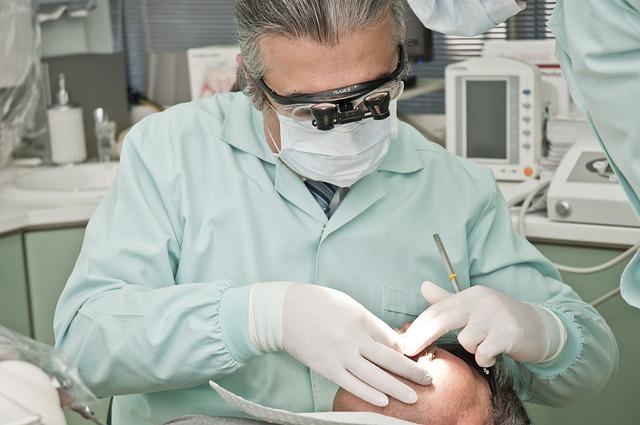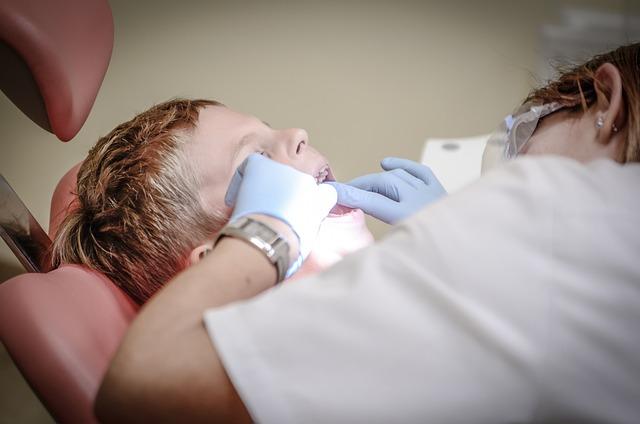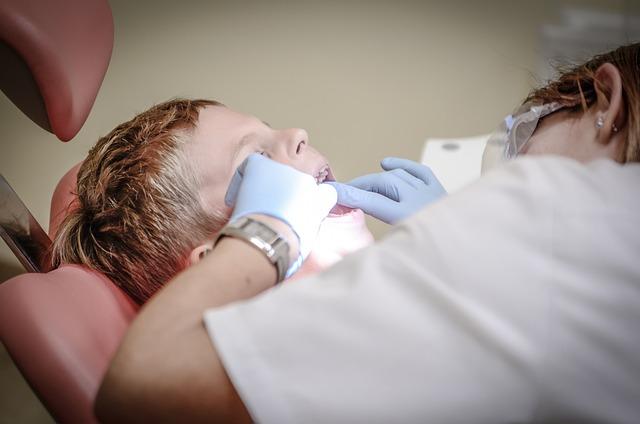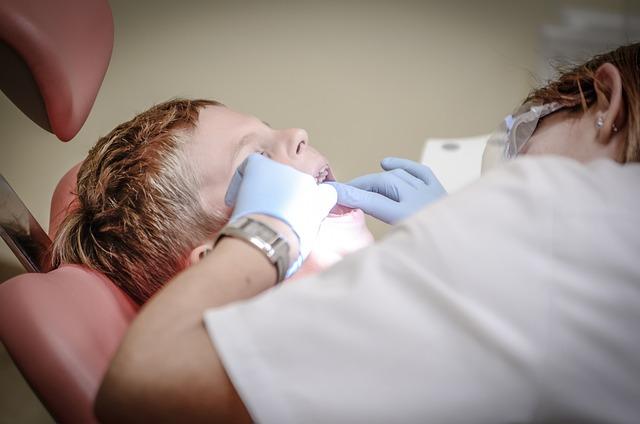Does Salt Affect Teeth? Dental Facts Uncovered
Salt is a staple ingredient found in every kitchen, enhancing the flavors of our favorite dishes. But have you ever wondered about its impact on our dental health? With dental facts finally uncovered, it’s time to separate fact from fiction and delve into the truth about salt and its effects on our teeth. In this article, we will explore the scientific evidence and expert opinions to confidently answer the burning question: does salt affect teeth? Prepare to be enlightened as we navigate the realms of dental knowledge, presenting you with a clear and unbiased understanding of the relationship between salt and your pearly whites.
1. The Impact of Salt on Dental Health: Unveiling the Truth behind Common Myths
Salt has long been associated with negative effects on dental health, but it’s time to debunk some of the common myths surrounding this topic. Contrary to popular belief, salt itself does not directly impact dental health in a negative way.
Here are the facts:
- Salt does not cause tooth decay: Tooth decay occurs when harmful bacteria in the mouth produce acid that erodes tooth enamel. Salt, on its own, does not contribute to this process.
- Salt does not weaken teeth: Another prevailing myth is that salt weakens teeth. However, there is no scientific evidence to support this claim. In fact, salt is a mineral that can have a strengthening effect on tooth enamel when consumed in moderation.
- Excessive salt consumption can indirectly affect dental health: While salt itself may not harm teeth, consuming excessive amounts of salty foods can lead to dehydration. Dehydration, in turn, can reduce saliva production, which plays a crucial role in maintaining oral health.
Overall, it is important to maintain a balanced diet and practice good oral hygiene habits to ensure optimal dental health. Don’t let common myths about salt mislead you; the impact of salt on dental health is often misunderstood.

2. Examining the Relationship between Salt Consumption and Tooth Decay
reveals interesting insights into oral health. While salt is commonly used for seasoning and preserving food, excessive consumption can have negative effects on tooth enamel and overall dental health.
Here are some key points to consider:
- Salt and tooth enamel erosion: Consuming high amounts of salt can lead to the erosion of tooth enamel, the protective outer layer of the teeth. This erosion can make teeth more susceptible to decay and cavities.
- Salivary gland stimulation: Salt has the ability to stimulate salivary glands, leading to increased saliva production. While saliva is essential for maintaining oral health, excessive salt intake can overstimulate the glands, causing an imbalance that may contribute to tooth decay.
- Link to dietary habits: High salt consumption is often associated with a diet high in processed foods and sugary snacks, which are known contributors to tooth decay. Therefore, it is essential to consider overall dietary habits when examining the relationship between salt consumption and oral health.
Understanding the relationship between salt consumption and tooth decay can help individuals make informed decisions about their dietary choices and take appropriate measures to maintain optimal oral health.

3. Scientific Insights: How Salt Affects Enamel and Dentin
Salt is a common ingredient in our diets, but have you ever wondered how it affects our teeth? Scientific research has provided valuable insights into the impact of salt on enamel and dentin, the two main components of our teeth. Here’s what you need to know:
1. Enamel erosion: Salt, especially when consumed in excessive amounts, can contribute to enamel erosion. This occurs when the outer layer of our teeth, called enamel, gradually wears away due to various factors, including exposure to acidic substances. Salt, with its abrasive nature, can act as a catalyst in this process, leading to weakened and more sensitive teeth.
2. Dentin hypersensitivity: Dentin is the layer beneath the enamel that protects the nerves of our teeth. Excessive salt consumption can cause dentin hypersensitivity, which manifests as tooth sensitivity to hot, cold, or sweet stimuli. The abrasive nature of salt can wear down the enamel and expose the dentin, making our teeth more susceptible to discomfort.
3. Maintaining oral health: While salt can have negative effects on enamel and dentin, it’s important to note that moderation is key. Incorporating a balanced diet, proper oral hygiene practices, and regular dental check-ups can help mitigate any potential harm caused by salt. Additionally, using toothpaste specifically formulated to combat enamel erosion and sensitivity can provide an extra layer of protection for your teeth.
4. Shedding Light on Salty Snacks: Are They Harming Your Teeth?
Salty snacks not only satisfy our cravings, but they also play a significant role in our oral health. While we often associate sugary foods with tooth decay, it’s important not to overlook the potential harm that excessive salt intake can have on our teeth. Here’s what you need to know about the effects of salty snacks on your oral health:
1. Enamel erosion: Consuming salty snacks can increase the acidity levels in your mouth, leading to the erosion of tooth enamel over time. This can make your teeth more sensitive to hot and cold temperatures, as well as increase the risk of cavities and tooth decay.
2. Dehydration: Salty snacks can be dehydrating, as excessive sodium intake can draw water from your body. Dehydration affects your saliva production, which plays a crucial role in washing away food particles and neutralizing acids in your mouth. Without enough saliva, your teeth are more susceptible to decay and gum disease.
3. Gum disease: The high sodium content in salty snacks can contribute to inflammation and swelling of the gums. This can lead to gum disease, characterized by redness, tenderness, and even bleeding gums. If left untreated, gum disease can progress and result in tooth loss.
To protect your teeth from the potential harm of salty snacks, it’s important to practice good oral hygiene. This includes regular brushing and flossing, as well as limiting your intake of salty foods. Additionally, maintaining a balanced diet and drinking plenty of water can help mitigate the negative effects of salt on your oral health.
5. The Role of Saliva in Minimizing Salt’s Negative Effects on Dental Health
The role of saliva is crucial in minimizing the negative effects of salt on dental health. Saliva acts as a natural defense mechanism in our mouths, working to protect our teeth and gums. Here are some ways in which saliva helps to counteract the impact of salt:
- Buffering properties: Saliva contains bicarbonate ions, which help to neutralize the acidity caused by salt. This buffering action helps to prevent the erosion of tooth enamel and reduces the risk of developing cavities.
- Washing away debris: Saliva helps to wash away food particles and bacteria from the oral cavity, including the salt residue. This cleansing action helps to maintain oral hygiene and prevent the formation of plaque and tartar.
- Stimulation of saliva flow: Chewing food stimulates the production of saliva, which aids in the breakdown and digestion of salt and other substances. Increased saliva flow also promotes the remineralization of teeth, strengthening their resistance against salt-induced damage.
By understanding the important role of saliva in minimizing the negative effects of salt on dental health, we can appreciate the significance of maintaining good oral hygiene and promoting saliva production through proper hydration and regular dental care.
6. Understanding the Link between Salt and Gum Disease: Separating Fact from Fiction
When it comes to gum disease, there are many misconceptions floating around, especially regarding the role of salt in its development. In this post, we aim to separate fact from fiction and shed light on the link between salt and gum disease.
Fact:
- Gum disease, also known as periodontal disease, is a bacterial infection that affects the gums and supporting structures of the teeth.
- Excessive salt consumption can contribute to high blood pressure, which is a risk factor for gum disease.
- Research suggests that a high-salt diet may increase the severity of gum disease and hinder the healing process.
Fiction:
- Using saltwater as a mouth rinse can cure gum disease: While saltwater rinses can provide temporary relief and help reduce inflammation, they do not eliminate the underlying cause of gum disease.
- Consuming less salt can reverse gum disease: While reducing salt intake is beneficial for overall health, it alone cannot reverse gum disease. Professional dental treatment and good oral hygiene practices are essential for managing the condition.
By understanding the facts and debunking the fiction surrounding salt and gum disease, you can make informed choices about your oral health. Remember to consult your dentist for personalized advice and treatment options.
7. Salt and Tooth Sensitivity: What You Need to Know
If you’ve been experiencing tooth sensitivity, you may have wondered about the role of salt in aggravating this discomfort. Let’s dive into the facts and dispel any misconceptions.
1. Saltwater Rinse: One common home remedy for tooth sensitivity is rinsing with a saltwater solution. Saltwater can help soothe irritated gums and reduce inflammation, providing temporary relief. However, it’s important to note that this is not a long-term solution and should not replace professional dental care.
2. Sodium Content: It’s true that excessive sodium intake can have negative effects on oral health. However, the salt used in cooking and seasoning typically contains minimal amounts of sodium chloride. Thus, moderate consumption of salt is unlikely to directly worsen tooth sensitivity.
3. Hydration: Maintaining proper hydration is crucial for overall oral health, including combating tooth sensitivity. Salt can play a role in hydration by helping the body retain water. However, it’s vital to strike a balance and not consume excessive amounts of salt, as this can lead to other health issues.
In conclusion, while saltwater rinses can provide temporary relief, it’s essential to seek professional dental advice for long-term solutions to tooth sensitivity. Moderate salt consumption, coupled with proper hydration, is unlikely to directly worsen tooth sensitivity. Remember, consulting with your dentist is always the best course of action to address any oral health concerns.
8. Debunking Sugar vs. Salt: Which Puts Your Teeth at Greater Risk?
In the ongoing debate about the effects of sugar and salt on dental health, it’s important to understand the facts before jumping to conclusions. While both substances can pose risks to your teeth, there are a few key differences that set them apart:
- Sugar: This sweet culprit is often associated with cavities and tooth decay. When we consume sugary foods and drinks, the bacteria in our mouths feed on these sugars and produce acids that erode tooth enamel. Over time, this can lead to the formation of cavities. It’s important to limit our intake of sugary treats and practice proper oral hygiene to minimize the risk.
- Salt: Unlike sugar, salt itself does not contribute directly to tooth decay. However, excessive salt intake can lead to dehydration, which in turn affects our saliva production. Saliva plays a crucial role in maintaining oral health by neutralizing acids and washing away food particles. When our mouths become dry due to dehydration, it can increase the likelihood of developing tooth decay.
While sugar does have a more direct impact on dental health, it’s important to note that both sugar and salt should be consumed in moderation for overall well-being. A balanced diet, regular dental check-ups, and good oral hygiene practices are key to maintaining a healthy smile. Remember, knowledge is power when it comes to making informed choices about what we consume and how it impacts our teeth.
9. Practical Tips to Maintain Dental Health in the Face of Salt Consumption
When it comes to maintaining dental health while consuming salt, there are several practical tips that can help you keep your teeth and gums in good condition. Here are some expert suggestions:
- Brush your teeth regularly: Make sure to brush your teeth at least twice a day with a fluoride toothpaste. This will help remove plaque and prevent tooth decay.
- Floss daily: Along with brushing, flossing daily is essential to remove food particles and plaque from between your teeth and along the gumline.
- Limit salt intake: While salt is an important part of our diet, excessive consumption can lead to oral health problems. Be mindful of your salt intake and try to limit it to recommended levels.
- Drink plenty of water: Drinking water helps wash away food particles and bacteria, reducing the risk of dental issues. It also helps maintain saliva production, which is crucial for oral health.
- Visit your dentist regularly: Regular dental check-ups are vital to detect any early signs of dental problems and receive professional cleaning. Your dentist can provide personalized advice based on your oral health needs.
By following these practical tips, you can maintain good dental health even in the face of salt consumption. Remember, a healthy smile starts with proper oral care and a balanced diet.
10. Expert Advice: Balancing Salt Intake for Optimal Dental Well-being
The key to maintaining optimal dental well-being lies in balancing your salt intake. While salt is an essential mineral for our bodies, excessive consumption can lead to negative effects on dental health. Here are some expert tips to help you find the right balance:
1. Understand the role of salt: Salt, or sodium chloride, plays a crucial role in various bodily functions, including maintaining fluid balance and nerve function. However, excessive salt intake can contribute to gum disease and tooth decay. It’s important to be aware of the amount of salt you consume daily.
2. Check food labels: Many processed and pre-packaged foods contain high levels of sodium. Always read the nutritional information on food labels to determine the salt content. Opt for low-sodium alternatives whenever possible.
3. Moderate salt usage: Limiting the amount of salt you add to your meals can significantly reduce your overall intake. Experiment with other seasonings and herbs to enhance the flavor of your dishes without relying on excessive salt.
4. Rinse with saltwater: Saltwater rinses can help promote oral health by reducing inflammation and killing bacteria. Mix half a teaspoon of salt in warm water and swish it around your mouth for 30 seconds before spitting it out.
5. Stay hydrated: Drinking plenty of water can help flush out excess salt from your body and improve saliva production. Saliva plays a crucial role in protecting your teeth from decay.
By following these expert tips, you can strike the right balance in your salt intake, ensuring optimal dental well-being. Remember, moderation is key when it comes to salt consumption.
Frequently Asked Questions
Q: Does salt affect teeth? Dental facts uncovered.
A: Absolutely! Salt does have an impact on dental health.
Q: How does salt affect teeth?
A: Salt, when consumed in excessive amounts, can lead to a variety of dental problems.
Q: What are the dental problems caused by excessive salt consumption?
A: Excessive salt consumption can cause dental problems such as tooth decay, gum disease, and enamel erosion.
Q: Why does salt contribute to tooth decay?
A: Salt promotes tooth decay because it contains sodium, which can weaken the enamel and make teeth more susceptible to cavities.
Q: Can salt consumption lead to gum disease?
A: Yes, it can. Excessive salt intake can irritate the gums and contribute to the development of gum disease.
Q: How does salt contribute to enamel erosion?
A: Salt, when consumed in high quantities, can create an acidic environment in the mouth, leading to enamel erosion over time.
Q: Is all salt harmful to teeth?
A: No, not all salt is harmful to teeth. It’s the excessive consumption of salt that poses risks to dental health.
Q: Are there any dental benefits to consuming salt?
A: In moderation, salt can actually have some dental benefits. It can help remineralize teeth and promote a healthy pH balance in the mouth.
Q: How can one minimize the negative effects of salt on teeth?
A: To minimize the negative effects, it’s crucial to maintain good oral hygiene practices, such as brushing and flossing regularly, and limiting salt intake to recommended levels.
Q: What are the recommended levels of salt intake?
A: The World Health Organization recommends consuming less than 5 grams of salt per day to maintain overall health, including dental health.
Q: Can switching to low-sodium salt be beneficial for dental health?
A: Switching to low-sodium salt can be beneficial, as it reduces the amount of sodium consumed, thereby minimizing the risk of tooth decay and other dental issues.
Q: Are there any other dietary factors that can affect dental health?
A: Yes, besides salt, other dietary factors like sugar consumption and acidic foods and drinks can also impact dental health.
Q: How can one maintain good dental health overall?
A: Besides watching salt intake, maintaining good dental health involves a well-balanced diet, regular dental check-ups, proper oral hygiene practices, and avoiding harmful habits like smoking.
Q: Is it possible to enjoy salt in our diet while still maintaining good dental health?
A: Absolutely! By consuming salt in moderation and adopting a comprehensive approach to dental care, it is possible to enjoy salt in our diet while still maintaining good dental health.
To Wrap It Up
In conclusion, the impact of salt on our teeth is a topic worth exploring. While salt itself does not pose a direct threat to dental health, it is important to be mindful of our overall oral hygiene practices. Regular brushing and flossing, coupled with a balanced diet and limited salt consumption, can help maintain a healthy smile. Additionally, excessive salt intake can lead to a range of health issues beyond just dental concerns, highlighting the importance of moderation. Remember, knowledge is power, and armed with these dental facts, we can make informed choices to safeguard our oral health. So, let’s embrace a balanced approach to salt consumption and keep our teeth shining bright!






